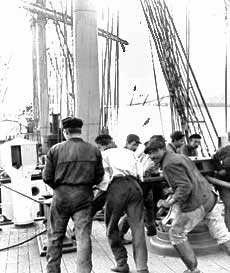Early Colonial trade in the Puget Sound
Jesse Forman
4/24/07
Working the waters
Rough Draft
Early Colonial trade in the Puget Sound
The Pacific Northwest was one of the last coastal areas in the modern US to be colonized by European traders. These traders arrived in the Puget Sound area with a broad knowledge of trading practices and cultural practices of other Indian groups. A characteristic of early trade in the northwest was the reliance of the Europeans on Indians supplying food and other necessities. Though the Indians were not dependent on the traders for necessities, they found many of their products to be indispensable. Mutually beneficial exchanges of goods led to relations between the separate groups that indelibly mixed the separate populations. Traders and Indians fashioned mutually agreeable cultural practices in order to further their ability to trade.
According to their religious beliefs, the Skagit and Klallum people understood the Europeans more in terms of their individual powers, rather than their abilities to unify as a single force.
Cultural exchanges were encouraged by the perceived economic gains to be had by adopting foreign practices. In particular, Indians adopted Christian worship practices, and adapted them into their own expressions. Traders rewarded their piety with goods such as shell money and blankets.
Puget Sound natives placed a high value on extending social through marital ties, which led to intermarriage between whites and natives.
The commercial and cultural exchanges that resulted from the presence of colonial traders in the Puget sound area created a social structure much different from that present before their arrival, and one that has had lasting affects on the social structure of the modern day Puget Sound area.

